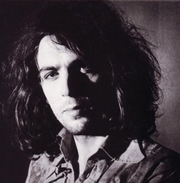Search
Rychard Carrington reports on The City Wakes Gala Performance – Trinity College Chapel, Cambridge 1 November 2008

The City Wakes, a festival of Syd Barrett that took place in many different venues in many diverse forms in his hometown of Cambridge, was a magnificent achievement. In its own right it was a special event, of which Cambridge should be proud. It had all the imaginative enterprise of the 1960s counter-culture, but was much better organised.
The festival included talks, concerts, art exhibitions, music workshops, a play, a happening, an ‘audiovisual collision', tours of Cambridge by foot, minibus and motorbike. The finale was a gala night concert performance in Trinity College Chapel, at which your Moving Tone reviewer was present.
At first I felt very conscious of cultural connotations. The Sixties Underground in Trinity College Chapel: Peter WynneWillson's light show, once resident at the UFO Club, projected, forty years later, over this high establishment place of worship, where statues of Tennyson and Macaulay looked on severely. In truth, I found it slightly disturbing: I like my counter-culture thoroughly counter, my high culture steadfastly august and respectful of tradition. Does not one desire certain bastions than imply a reassuring permanence of cultural value, and perhaps of spiritual truth? Yet here was the epitome of free spirit, not running amok but accommodating the cultural configuration with seeming comfort, as if we all merely inhabit our particularly contemporary cultural matrix obediently.
A special performance was needed, to match the special occasion. Fortunately, one was supplied. Conductor Simon Gunton and a large ensemble performed a set of mostly Barrett compositions, thoroughly, imaginatively and tastefully rearranged. The results were not rock at all, but a sound akin to modern classical song, with a substantial jazz element - not the free jazz which was probably an influence on the early Pink Floyd, but the elegant night club variety. Nearly all the singing was done by female vocalists - each excellent - thus distancing the material further from the recordings by Barrett which many of us present knew and loved so well.
The fact that this was an ensemble of (utterly professional-sounding) performers nearly all of whom had, like Barrett, encountered mental illness at some time in their lives, and that the whole festival raised money for Escape Artists, a group employing the creative arts in the mental health field and in prisons, added considerably to the occasion.
Every song was a triumph. These songs were, in order: Astronomy Domine, The Scarecrow, Terrapin, Dominoes, Maisie, Jugband Blues, In Us Confide (a new composition by the ensemble), Brain Damage, High Hopes, See Emily Play, Lucifer Sam, Bike, Dark Globe, and a climactic, celebratory Arnold Layne, with Astronomy Domine then repeated as an encore.
The City Wakes' exciting and very worthy aspirations were superbly realised. Yet the success of the festival, and of this musical performance in particular, points to a brilliance which it cannot contain. That brilliance is, of course, that of Syd Barrett himself. Syd's genius was inscrutable and compelling, thoroughly individual yet symbolic of the most elemental human aspirations - most acutely in the development of 1967 expansive bliss to subsequent withdrawal into unknown terrain (leaving behind a legacy of abandonment subsequently expressed powerfully in the surviving Pink Floyd's monuments to alienation of the 1970s). He was far, far more than a great talent who became a victim of mental illness in a way that provided entertainment for the callous and occasional flashes of poetic insight. His solo recordings were not just rudimentary versions of songs which came to full fruition with Simon Gunton's much fuller, more intricate arrangements. Taking Syd's songs out of the context of his own performances both brought out their strength as discrete compositions, and detached them from the essence of Syd's unique world. The sassy feather boa version of Terrapin, for instance, was quite something in itself (especially in the incongruous setting of Trinity College Chapel) yet also brought home an awareness of the unique emotional potency of Syd's ‘I'll do my loving in the winter' solipsistic cocoon from which it had been extracted. Particularly during the unaccompanied choral version of Dark Globe and, most of all, Jugband Blues, it was not the imaginative new arrangements but the stark ‘lost in the woods' sentiments of Syd's words that took on extra power in the setting of this sacred institution, with Benjamin West's picture of St. Michael binding Satan above the altar and psychedelic projections all over the beautiful architecture of a bygone spirituality. Who floats away, eternally elusive in that blue bubble moving up the stained glass window? Is it Syd, is it Sixties aspirations of spiritual resolution, or is it our own souls, forever awry and alone? The last words should be Syd's (Jugband Blues):
It's awfully considerate of you to think of me here
And I'm much obliged to you for making it clear
That I'm not here.
And I never knew we could be so thick
And I never knew we could be so blue
And I'm grateful that you threw away my old shoes
And brought me here instead dressed in red
And I'm wondering who could be writing this song.
I don't care if the sun don't shine
And I don't care if nothing is mine
And I don't care if I'm nervous with you
I'll do my loving in the winter.
And the sea isn't green.
And I love the queen.
And what exactly is a dream?
And what exactly is a joke?
Writer: Rychard Carrington